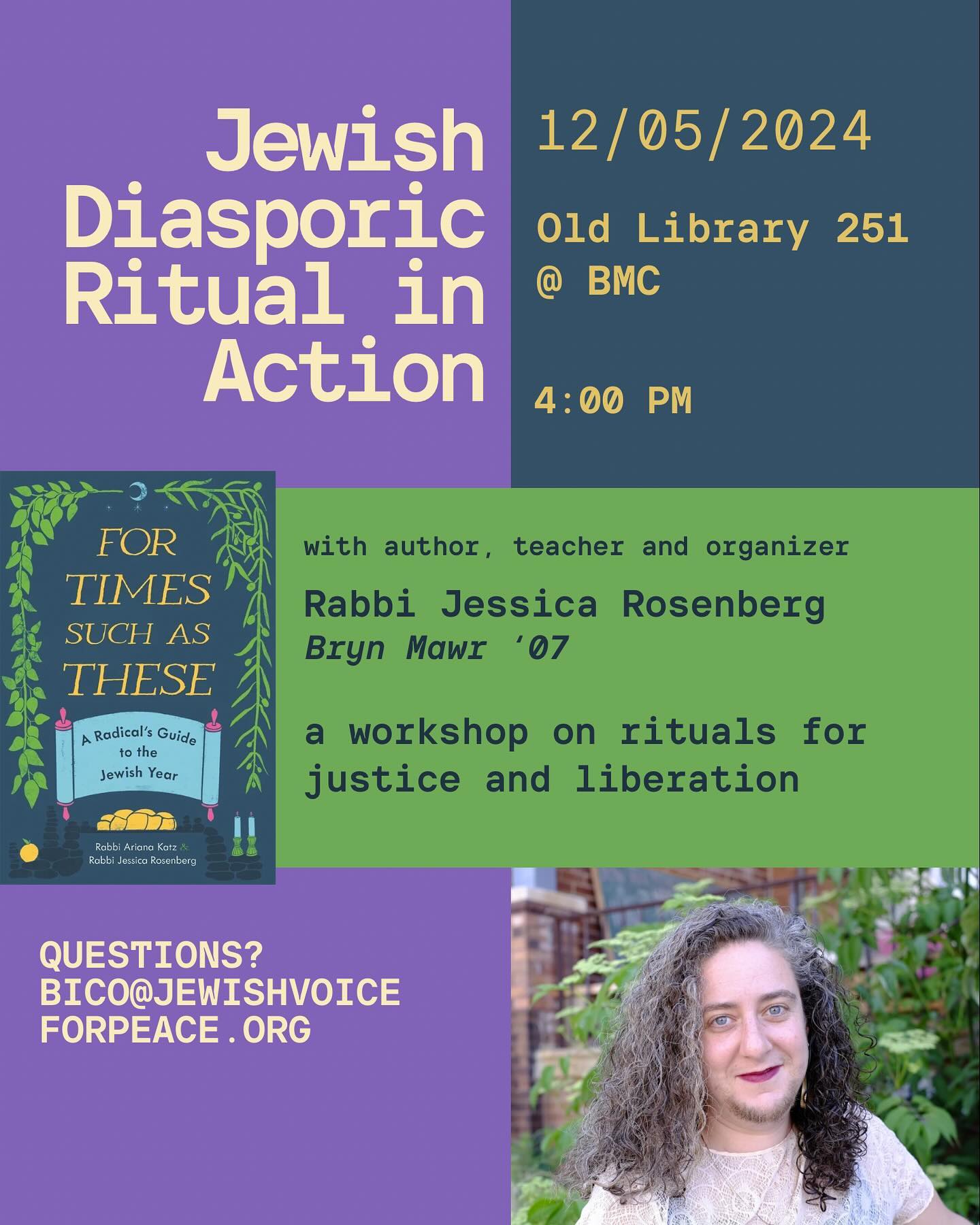The Bi-College chapter of the student activism organization Jewish Voice For Peace (JVP) hosted Rabbi Jessica Rosenberg, Bryn Mawr class of ‘07, on February 28 as a part of her tour around several colleges to discuss her book “For Times Such as These: A Radical’s Guide to the Jewish Year.” Rosenberg led participants in a workshop that explored themes of social justice in connection to spirituality, community, and how to “level up” as organizers at the unique intersection of religion and activism.
The book was published in 2024, and Rosenberg wrote it in collaboration with Rabbi Ariana Katz. She shared that her goal in creating the book was to combine what she described as the deeply Jewish tradition of seeking justice with a guide to the practices of the various holidays and traditions throughout the Jewish calendar. The book includes prayers, explanations of rituals, discussion questions, and more, all centering themes of activism and social justice. A large portion of the book and Rosenberg’s career focus on practicing Judaism while being critical of Israel.
Rosenberg said that after graduating from Bryn Mawr in 2007, she was exposed to a different perspective on the history of Israel than she had known prior. She described that she “had to relearn everything I was taught about Jewish history.”
She explained that “learning about occupation and the history of colonization was so counterintuitive to what I’d learned” about Israel in the past that she experienced a great deal of cognitive dissonance. “What I’d been taught was we teach justice and liberation.”
The experience drove Rosenberg to pursue rabbinical study in 2012 and to gain a deeper knowledge of Jewish history. She described that in the early 2010s, “there was not access to religious, politically left ritual,” and rabbinical school was one of the only places for that kind of Jewish learning. She noted that she hadn’t necessarily always pictured herself as a rabbi but said it made sense with her background. She is “the child of synagogue board members” and has always loved fostering traditions, even working as a customs person and hall advisor while at Bryn Mawr. She attended and was ordained at Reconstructionist Rabbinical College in Wyncote, Pennsylvania. Reconstructionist Judaism is a very progressive sect, and this college in particular focused on history. Rosenberg said that this combination interested her because she “wanted to understand how we got here.”
“Our ancestral traditions can only make sense if they’re infused with our values.”
JESSICA ROSENBERG
Around this time, Rosenberg also became involved in Jewish Voice for Peace, where she has been on the Rabbinical Council since 2013. She said that in that era, the organization involved less ritual practice and was more singularly focused on its political aims. However, she is glad to see spirituality and social justice pursued in connection at JVP today. During the workshop, she commented, “Our ancestral traditions can only make sense if they’re infused with our values.”
Throughout the workshop, Rosenberg led several exercises that called on participants to reflect on how they felt about Judaism, their communities, their work as organizers, and how religion shows up in their lives. She fostered an informal and vulnerable environment, and attendees were enthusiastic to share.
Several participants noted a sense of isolation or alienation within their families or religious communities for a variety of reasons. Some felt they didn’t have room to have open dialogues about Israel and Palestine in the religious spaces where they felt comfortable. Others described feeling out of touch with their Jewish community because they had not been raised with as many strong traditions.
One key aspect of Rosenberg’s program was discussing Passover, a holiday commemorating the exodus of Jewish people from Egypt that is recorded in the Torah. She encouraged participants to think of a seder, the ritual dinner and reading of stories before the passover meal, as “an interactive workshop…everything that’s on the table has the opportunity to tell a story or bring in a new story.” She highlighted the themes of political resistance and community that are present in the holiday. Participants reflected on how they could bring this into their Passover plans in April.
The workshop concluded with a Shabbat service at sundown, which included added prayers for justice and peace, along with several songs and readings underscoring JVP’s political focus.
